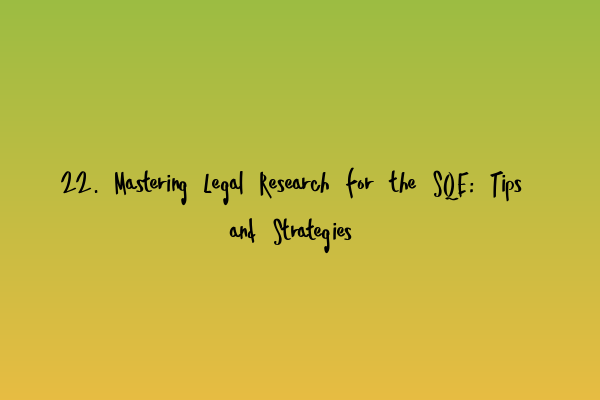Mastering Legal Research for the SQE: Tips and Strategies
In order to successfully conquer the Solicitors Qualifying Examination (SQE), it is imperative to possess excellent legal research skills. Legal research is not only a crucial component of the law profession, but it is also a key area that the SQE evaluates. To help you excel in this aspect, we have compiled 22 essential tips and strategies that will aid you in mastering legal research for the SQE. Whether you are a new law graduate or an experienced legal practitioner looking to enhance your skills, this comprehensive guide is designed to provide you with the knowledge and techniques to excel in the SQE.
1. Familiarize Yourself with Online Legal Databases: Online legal databases such as Westlaw, LexisNexis, and CaseCheck are invaluable tools for legal research. Familiarize yourself with these platforms, their functionalities, and their search capabilities.
2. Develop a Solid Keyword Strategy: Keywords are the essence of effective legal research. Identify relevant keywords and phrases related to your research topic to yield accurate and targeted results.
3. Utilize Advanced Search Techniques: Explore advanced search techniques such as Boolean operators (AND, OR, NOT) and quotation marks to refine your search results and find more relevant information.
4. Stay Up-to-Date with Legal News: Keeping abreast of recent legal developments is crucial for effective legal research. Subscribe to legal newsletters, follow legal blogs, and regularly check legal news websites to stay updated.
5. Make Use of Secondary Sources: Secondary sources such as legal textbooks, law journals, and legal encyclopedias can provide valuable insights and guidance on legal issues. Utilize these resources to deepen your understanding and support your arguments.
6. Refine Your Analytical Skills: Legal research requires strong analytical skills. Develop the ability to critically evaluate and interpret legal cases, statutes, and other legal materials. Practice identifying relevant legal principles and applying them to different scenarios.
7. Understand the Hierarchy of Legal Authorities: Familiarize yourself with the hierarchy of legal authorities in your jurisdiction, including statutes, case law, and regulations. Prioritize your research accordingly, giving more weight to higher-ranking authorities.
8. Use Citations to Find Related Material: Citations within legal sources can lead you to related cases, statutes, and legal commentary. Use these citations to expand your research and find additional relevant material.
9. Check for Updates and Revisions: Laws and regulations are subject to updates and revisions. Always check for the latest versions of statutes and cases to ensure the accuracy and relevance of your research.
10. Develop Effective Note-Taking Techniques: Efficient note-taking during legal research is essential for later reference and organization of information. Develop a system that works for you, whether it’s using digital tools or traditional pen and paper.
11. Explore Foreign and International Legal Resources: Depending on the nature of your research, it may be necessary to consult foreign or international legal sources. Familiarize yourself with relevant databases and resources specific to international law.
12. Network with Legal Professionals: Engage with other legal professionals, attend legal conferences, and join professional organizations to expand your network. Networking can provide access to valuable resources and insights that may enhance your research.
13. Consider Alternative Dispute Resolution Methods: When researching legal issues related to dispute resolution, consider alternative methods such as mediation and arbitration. Familiarize yourself with the legal frameworks and specific resources related to these areas.
14. Efficient Use of Legal Precedents: Develop a thorough understanding of legal precedents and their significance. Analyze how previous cases have been decided and use them to support your arguments and strengthen your research.
15. Take Advantage of SQE-Specific Resources: The SQE is a unique examination that requires specific preparation. Make use of resources specifically designed for the SQE, such as past papers, SQE-specific textbooks, and preparation courses.
16. Stay Organized: Effective organization is key to successful legal research. Develop a system for storing and organizing your research materials, including cases, statutes, articles, and any other relevant documents.
17. Practice Time Management: Time management is essential during legal research. Set goals, allocate specific time slots for research, and prioritize your tasks based on importance and urgency.
18. Efficient Use of Technology: Embrace technology tools that can enhance your legal research process, such as case management software, legal research apps, and document comparison tools.
19. Understand the Concept of Judicial Precedent: Judicial precedent is a fundamental aspect of legal research. Familiarize yourself with the concept, including the binding and persuasive nature of precedents.
20. Develop Strong Legal Writing Skills: Legal research and writing go hand in hand. Practice structuring coherent and persuasive arguments, ensuring your research findings are effectively communicated.
21. Stay Persistent and Disciplined: Legal research can be challenging and time-consuming. Stay persistent, disciplined, and committed to finding the necessary information to support your research objectives.
22. Seek Guidance and Feedback: Don’t hesitate to seek guidance and feedback from legal mentors, professors, or fellow professionals. Their insights can help you refine your research techniques and improve your overall proficiency.
By following these 22 tips and strategies, you can enhance your legal research skills, excel in the SQE, and elevate your proficiency as a legal professional. Remember, practice and persistence are key to becoming a master of legal research. Good luck!

Leave a Reply